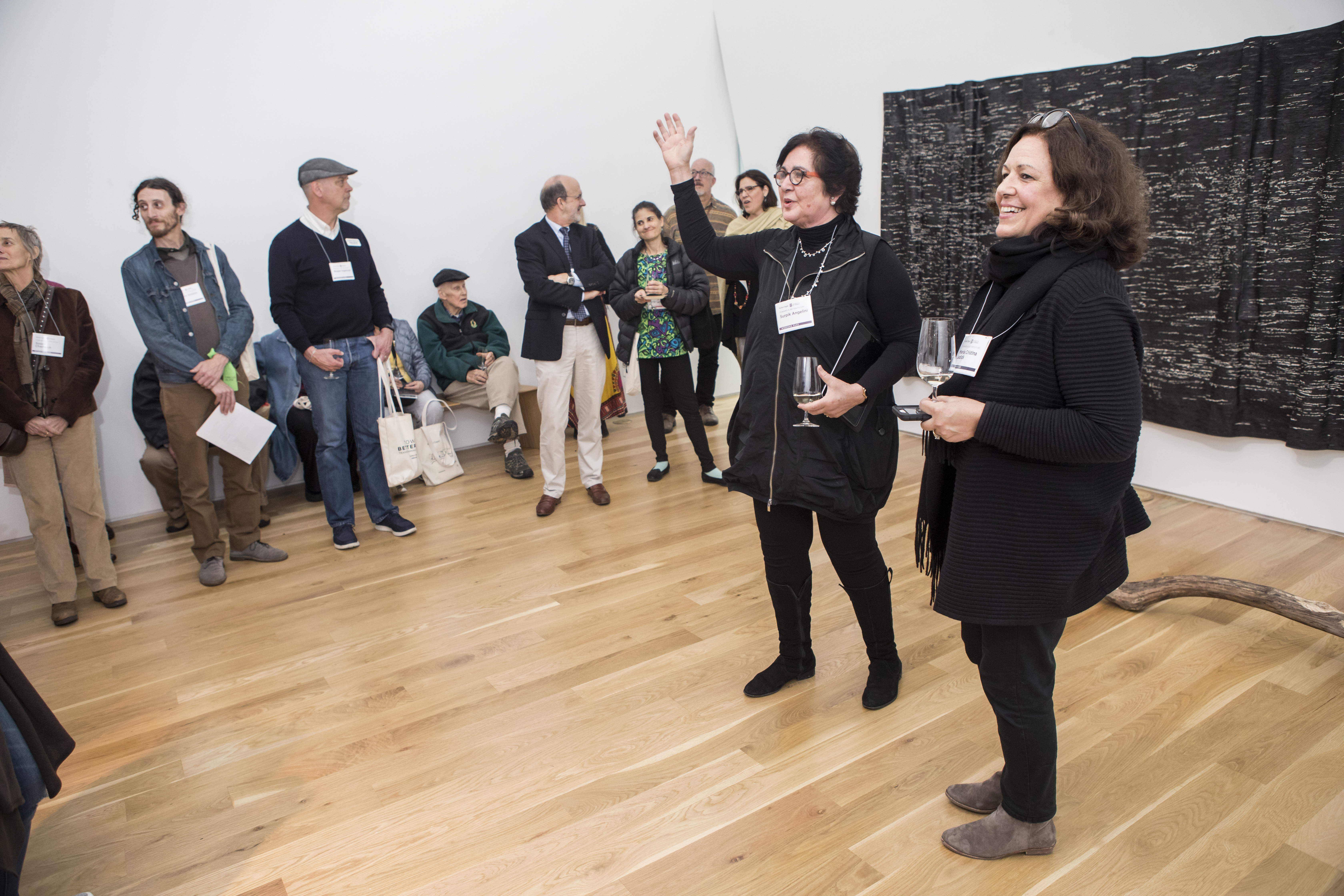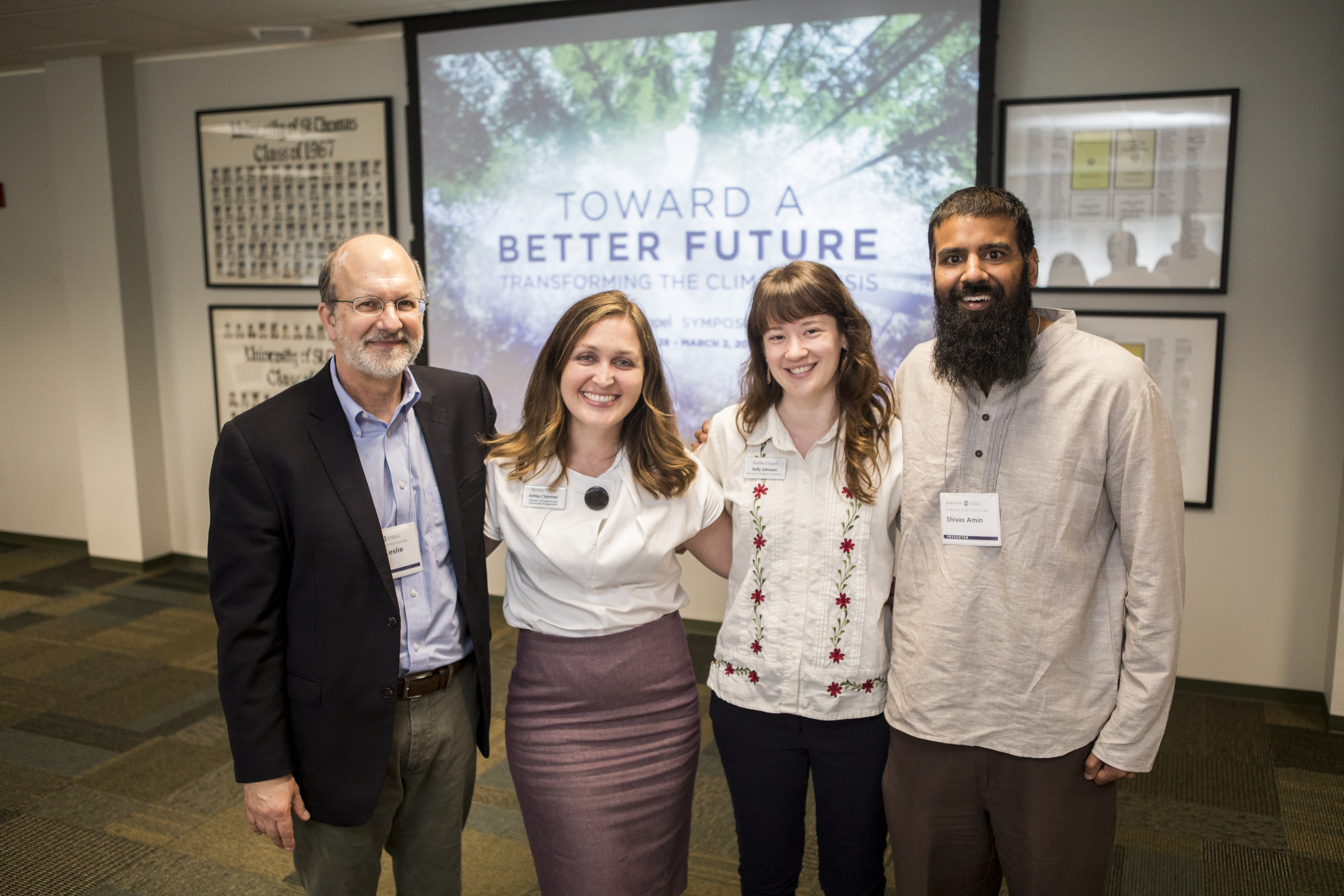Toward a Better Future: Transforming the Climate Crisis
The Rothko Chapel and University of St. Thomas hosted a three day symposium exploring the current climate crisis, its impact on vulnerable communities, and mitigation efforts being implemented locally and nationally.
Given the global interconnectedness of the climate crisis, the symposium explored how best to move to a zero emission, low carbon economy through the engagement of presenters from religious, Indigenous, public health, energy, government, philanthropic, academic and arts sectors and communities. A central focus was on individual and institutional actions, practices and policies that must be taken to create a more livable and equitable future.
Opening Keynote Address, Thursday, February 28, 7pm
Somini Sengupta, The New York Times International Climate Reporter and George Polk Award-winning foreign correspondent
Rothko Chapel
 Climate change is not only about the planet--it's about the past, present, and future of the people who live here. Sengupta shared reflections from her writings about the human toll of climate change on vulnerable communities around the world.
Climate change is not only about the planet--it's about the past, present, and future of the people who live here. Sengupta shared reflections from her writings about the human toll of climate change on vulnerable communities around the world.
Somini Sengupta, The New York Times’s international climate reporter, tells the stories of communities and landscapes most vulnerable to the effects of climate change. A George Polk Award-winning foreign correspondent, she has reported from a Congo River ferry, a Himalayan glacier, the streets of Baghdad and Mumbai and many places in between. As The Times’s United Nations correspondent, she reported on global challenges from war to women's rights. Her first book, The End of Karma: Hope and Fury Among India's Young was published in 2016 by W.W. Norton. She grew up in India, Canada and the United States, graduating from the University of California at Berkeley.
FRIDAY, MARCH 1: 8am-9pm
8am-8:30am
Continental Breakfast
Rothko Chapel Plaza
8:30-8:45am
Morning Observance
Rothko Chapel
Tiokasin Ghosthorse, Founder, Host, and Executive Producer of First Voices Indigenous Radio and Member of the Cheyenne River Lakota Nation of South Dakota
8:45-10:15am
Navigating Climate Change: An Interfaith Conversation
Rothko Chapel
This interfaith conversation explored the map of climate change and how to navigate it through the lenses of Christian, Jewish, Hindu and Sikh traditions. Panelists spoke about what they see as possible paths to take, and whether we might reimagine new ones going forward.
- Vijaya Nagarajan, Associate Professor in Department of Theology and Religious Studies and the Program of Environmental Studies at University of San Francisco
- Sister Damien Marie Savino, F.S.E., Ph.D., Dean of Science and Sustainability at Aquinas College
- Rajwant Singh, President at EcoSikh and Executive Director of Guru Gobind Singh Foundation
- Rabbi Daniel Swartz, Spiritual Leader at Temple Hesed and Executive Director of Coalition on the Environment and Jewish Life (COEJL)
- Moderator: Steve Kolmes, Chair of the Environmental Studies Department and Molter Chair in Science at the University of Portland
10:30-11:45am
Impact of Climate Change on Mind, Body, and Spirit
Rothko Chapel
The impact of climate change is vast—impacting our countries, cities, communities, homes and each of us on a personal level. This conversation explored the physical, psychological and spiritual effects of the changing climate, engaging the perspectives of a public health official, a research psychologist, and an Indigenous leader from the Lakota Tribe.
- Tiokasin Ghosthorse, Founder, Host, and Executive Producer of First Voices Indigenous Radio and member of the Cheyenne River Lakota of South Dakota
- Christie Manning, PhD, Assistant Professor of Environmental Studies and Psychology at Macalester College
- Umair A. Shah, Executive Director and Local Health Authority for Harris County Public Health Department
- Moderator: Alejandro Chaoul, Director of The Jung Center’s Mind Body Spirit Institute and Director of Education at the Integrative Medicine program at The University of Texas MD Anderson Cancer Center
12:30-1:45pm
Environmental Injustices faced by Frontline, Indigenous and Vulnerable Communities
University of St. Thomas
This presentation and conversation included a pre-recorded message and poetry video from Marshall Islander poet Kathy Jetñil-Kijiner. From oyster beds in Louisiana, to the Quinault Indian Nation in Washington state, low income communities and communities of color are disproportionately impacted by the changing climate. This presentation and discussion shared firsthand accounts of the realities three specific communities currently face, including their work toward change and the creative opportunities that arise to combat these injustices.
- Jim Morris, journalist and interim CEO of the Center for Public Integrity
- Bryan Parras, Co-Founder of the Texas Environmental Justice Advocacy Services (t.e.j.a.s.) and Dirty Fuels Gulf Coast Organizer at Sierra Club
- Fawn Sharp, President of the Quinault Indian Nation in the Pacific Northwest
- Moderator: Earthea Nance, PhD, PE, CFM, Associate Professor in the Department of Urban Planning and Environmental Policy at Texas Southern University
2-5:15pm
The Science, Policy, Technology, and Economics of Climate Change: Past, Present and Future
University of St. Thomas
This cross-sector, interactive session shined a light on the perspectives and work of scientists, economists, policy makers, environmentalists, and engineers, and included presentations, breakout discussions and a moderated conversation.
- Jim Blackburn, Co-Director of Severe Storm Predication, Education, and Evacuation from Disaster (SSPEED) Center
- Mark Boling, Founder and CEO of 2C Energy, LLC
- Astrid Caldas, Senior Climate Scientist at Union of Concerned Scientists
- Maha N. Haji, Massachusetts Institute of Technology (MIT), Department of Mechanical Engineering, Research Affiliate
- Amy Myers Jaffe, David M. Rubenstein Senior Fellow for Energy and Environment and Director of the Program on Energy Security and Climate Change at the Council on Foreign Relations
- Michael Skelly, Senior Advisor of Renewable Energy & Sustainability at Lazard
5-6:30pm
“Exitium” (On the Edge of Destruction) Exhibition and Reception
Transart Foundation for Art and Anthropology
Climate change is causing extreme weather conditions worldwide: entire communities are destroyed by catastrophic events driven by hurricane force winds, water, drought, and fire. Hurricane Harvey exposed a collective "failure of imagination" to fathom its widespread havoc-wreaking power. Houston-based artist Maria Cristina Jadick respondes to these climate realities with multimedia sculpture and installation.
7-8:30pm
Not Ok: A Little Movie About a Small Glacier at the End of the World (2018) Film Screening and Q&A
University of St. Thomas
With Dominic Boyer, Professor of Anthropology at Rice University and Founding Director of the Center for Energy and Environmental Research in the Human Sciences, and Cymene Howe, Associate Professor and Director of Graduate Studies in the Department of Anthropology and founding faculty of the Center for Energy and Environmental Research at Rice University
Iceland is a country known across the world for the beauty of its 400+ glaciers. But it is now losing 11 billion tons of glacial ice each year because of global warming. In 2014, Icelandic scientists announced that the country's first major glacier, Okjökull (known to most by its nickname "Ok"), had ceased to be. In 2017, U.S. anthropologists Cymene Howe and Dominic Boyer teamed up with Icelandic filmmaker Ragnar Hansson to make a documentary film about what losing their first glacier means to Icelanders and what it should mean to all of us.
SATURDAY, MARCH 2: 8am-3pm
8-8:30am
Continental Breakfast
Rothko Chapel Plaza
8:30-9am
Morning Observance and Poetry
Rothko Chapel
"Multiple Choice Test after the Hurricane," by Jackson Neal, Houston Youth Poet Laureate and National Youth Poet Laureate Ambassador
9-10:15am
Young Activists Speak Out
Rothko Chapel
The people who are the least responsible for climate change are the ones who will be the most impacted long-term. Knowing this, they are taking the lead in making their demands for a livable climate known to the leaders of our cities and countries. This panel explored what young leaders from different parts of the country are doing to lead us toward a better climate future. Examples included a class action lawsuit against the government, a national youth-led protest march, and joining local advocacy groups and empowering young people to make change.
- Juan Elizondo, 31-year-old from Houston, Texas, Partnerships Coordinator and Instructional Specialist at Furr High School
- Jayden Foytlin, 15-year-old from Rayne, Louisiana, an indigenous climate activist, and a plaintiff in the case, Juliana v. United States
- Nadia Nazar, 16-year old from Baltimore, Maryland, Co-Founder, Co-Executive Director, and Art Director of Zero Hour
- Moderator: Estrella Sainburg, GreenFaith Organizer.
10:45am-12:15pm
Communicating Climate Change
University of St. Thomas
Our current climate crisis demands that we identify new modes of communication to convey the urgent moment we find ourselves in and to demonstrate why people should care. This presentation and conversation followed the work and perspectives of an artist, former coal miner, environmental journalist and Indigenous leader.
- Tiokasin Ghosthorse, Founder, Host and Producer of First Voices Indigenous Radio and a member of the Cheyenne River Lakota Nation of South Dakota
- Jim Morris, journalist and interim CEO of the Center for Public Integrity
- Eve Mosher, artist and creator of the HighWaterLine project
- Nick Mullins, former Appalachian coal miner and founder of Breaking Clean, an environmental communication firm working to develop messaging strategies across sociocultural and political divides
- Moderator: Christie Manning, PhD, Assistant Professor of Environmental Studies and Psychology at Macalester College
12:35-12:55pm
Remarks from the Mayor of Houston
University of St. Thomas
The Honorable Mayor Sylvester Turner gave a short address on climate initiatives in the city of Houston.
1-2:30pm
Legislation and Public Policy Strategies
University of St. Thomas
Positive climate change outcomes depend on sound legislative decisions at the local, state, and national levels. Attendees learned about current policy initiatives and how we can be more effective advocates.
- Lara Cottingham, Chief of Staff of the Administration and Regulatory Affairs Department and the Chief Sustainability Officer for the City of Houston
- Jay Blazek Crossley, Executive Director of Farm&City
- Luke Metzger, Executive Director of Environment Texas
- Bakeyah Nelson, Executive Director of Air Alliance Houston
- Moderator: Elizabeth Love, Senior Program Officer for the Houston Endowment, Inc.
There was an onsite interactive Poet-Tree station created by Writers in the Schools’ Bayouth Collective.
Many thanks to our promotional partners: Asia Society Texas Center; BikeHouston; Buffalo Bayou Partnership; Citizens' Environmental Coalition (Houston); Houston BCycle; Houston Climate Movement; Interfaith Environmental Network of Houston; The Jung Center of Houston, Texas; Lone Star Legal Aid; The Mind, Body, Spirit Institute at the Jung Center; Plant It Forward Farms; Public Citizen; and Sisters of Charity of the Incarnate Word.
For more information on event logistics and frequently asked questions, please click here.
Saturday, March 2, 2019
4:30 PM
View photos from all sessions here.
View videos from sessions inside the Chapel here.
Listen to audio recordings from all sesssions here.




















